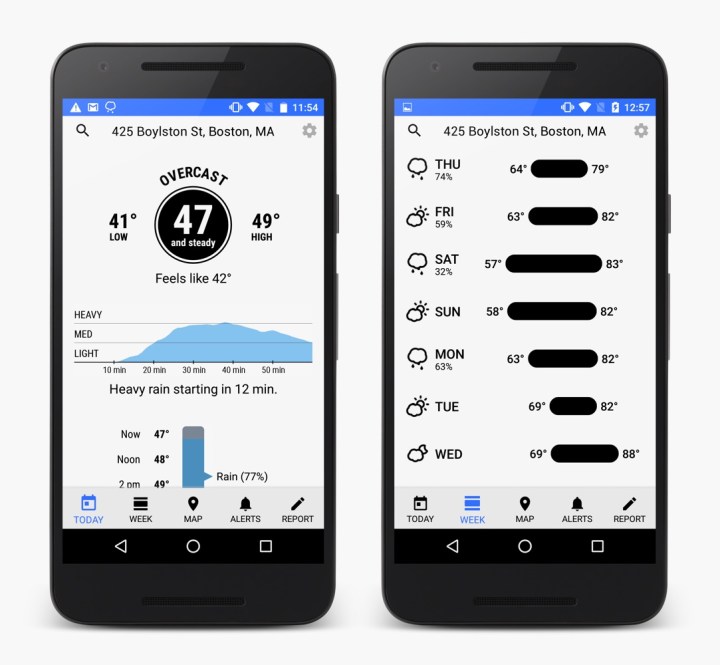
The accuracy of of Dark Sky’s climatological soothsaying — and indeed, a major reason for its passionate, borderline-obsessive following on iOS — is its hyperlocal, minute-by-minute approach to weather forecasting. The app regularly analyzes weather data from 19 national sources in addition to crowdsourced reports, government-run stations, and the barometer data on users’ iPhones. The algorithmic end result? Perfectly timed notifications that let you know exactly when rain, hail, snow, or any other atmospheric unpleasantries are expected to begin (i.e., “Heavy Rain starting in 15 minutes), and beautiful visualizations of those weather events. Dark Sky’s got animated maps for precipitation and temperature, a day-to-day timeline which indicates the likeliest hours for precipitation, a seven-day forecast, and a detailed view of weather metrics like chance of precipitation, relative humidity, UV index, and wind speed. And it’s all wrapped up in a minimalist black-and-white interface that’s clean, slick, modern, and wickedly responsive.

Thankfully, none of Dark Sky’s signatures were lost in translation. the Android app is, at least aesthetically and functionally speaking, pretty much on par with its iOS companion, and in some ways an improvement over it. Navigation between the various app tabs — Today, Week, Map, Alerts, and Report — has been relegated to a single bar at the bottom of the screen rather than, as on iOS, hidden behind left- and right-swipe gestures, and the app makes use of Android’s back button and text font. New home screen weather widgets show current conditions, the seven-day forecast, and chance of precipitation. And the app’s free … with a catch. While on Dark Sky on iOS is a one-time, $3.99 purchase, the
The rationale for subscription-based pricing, Dark Sky co-founder Adam Grossman told Forbes, had more to do with the running costs involved than any bias. “One of the big reasons we decided to experiment with subscriptions … is that we really think of Dark Sky as more of a service than just an app,” he said. The alternative — “cluttering up the app with ads” — was an approach the development team wanted desperately to avoid. And subscriptions, Grossman said, have an added benefit: accelerated development in the form of “new and expanded” features.
Dark Sky’s partnered with app incubator Applied Innovation to ensure the Android service receives the same amount of attention as the iOS version. “From the moment you turn on notifications, for example, you get your own little entry on one of our servers: It’s like your own personal robot that is constantly checking the weather, making sure you don’t get stuck in the rain.”
Dark Sky’s available on the Play Store now. To check if your region’s supported — the app mainly restricts reports to the U.S., U.K., Ireland, Canada, and Australia — head on over to the app’s Forecast site.
Editors' Recommendations
- Widget stacks is the best iOS feature that Android desperately needs
- The best coupon apps for iOS and Android
- The Best Dark Sky alternatives for Android
- The best video-editing apps for iOS and Android
- The best scanner apps for Android and iOS

